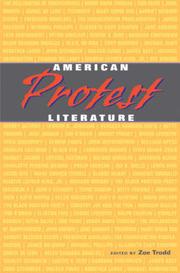Check nearby libraries
Buy this book

“I like a little rebellion now and then”—so wrote Thomas Jefferson to Abigail Adams, enlisting in a tradition that throughout American history has led writers to rage and reason, prophesy and provoke. This is the first anthology to collect and examine an American literature that holds the nation to its highest ideals, castigating it when it falls short and pointing the way to a better collective future.
American Protest Literature presents sources from eleven protest movements—political, social, and cultural—from the Revolution to abolition to gay rights to antiwar protest. Each section reprints documents from the original phase of the movement as well as evidence of its legacy in later times. Informative headnotes place the selections in historical context and draw connections with other writings within the anthology and beyond. Sources include a wide variety of genres—pamphlets, letters, speeches, sermons, legal documents, poems, short stories, photographs, posters—and a range of voices from prophetic to outraged to sorrowful, from U.S. Presidents to the disenfranchised. Together they provide an enlightening and inspiring survey of this most American form of literature.
Check nearby libraries
Buy this book

Previews available in: English
Showing 4 featured editions. View all 4 editions?
| Edition | Availability |
|---|---|
|
1
American Protest Literature
April 15, 2008, Belknap Press of Harvard University Press
Paperback
in English
- Paperback Edition
0674027639 9780674027633
|
eeee
Libraries near you:
WorldCat
|
| 2 |
zzzz
Libraries near you:
WorldCat
|
|
3
American Protest Literature
November 30, 2006, Belknap Press of Harvard University Press
Hardcover
in English
- First Edition
0674023528 9780674023529
|
aaaa
Libraries near you:
WorldCat
|
|
4
American Protest Literature (The John Harvard Library)
November 30, 2006, Belknap Press
Hardcover
in English
0674023528 9780674023529
|
zzzz
Libraries near you:
WorldCat
|
Book Details
Table of Contents
Edition Notes
Includes bibliographical references (p. 519-527) and index.
Classifications
Contributors
The Physical Object
ID Numbers
Community Reviews (0)
Feedback?| April 6, 2024 | Edited by bitnapper | Merge works (MRID: 129984) |
| November 29, 2023 | Edited by AgentSapphire | Edited without comment. |
| November 29, 2023 | Edited by JKPES24 | Removed the editor, afterword author, and forward author from main author field. |
| November 22, 2023 | Edited by JKPES24 | added description |
| December 27, 2017 | Created by ImportBot | import new book |












